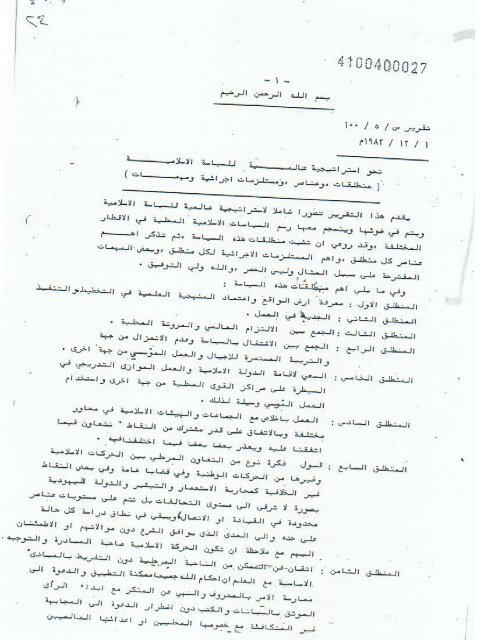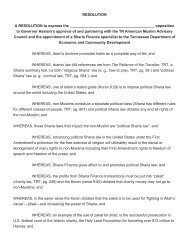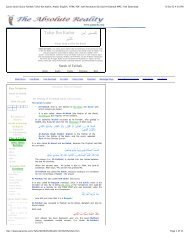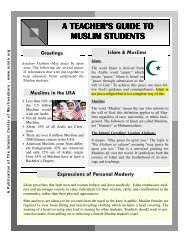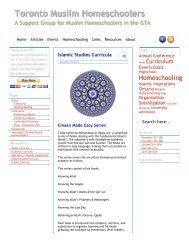The Muslim Brotherhood âProjectâ - Glenn Beck
The Muslim Brotherhood âProjectâ - Glenn Beck
The Muslim Brotherhood âProjectâ - Glenn Beck
- No tags were found...
You also want an ePaper? Increase the reach of your titles
YUMPU automatically turns print PDFs into web optimized ePapers that Google loves.
<strong>The</strong> <strong>Muslim</strong> <strong>Brotherhood</strong> "Project"<strong>The</strong> following English translation of <strong>The</strong> Project has been prepared by Scott Burgessand was first published in serial form by <strong>The</strong> Daily Ablution in December 2005 (PartsI, II, III, IV, V, Conclusion). It is based on the French text of <strong>The</strong> Project published inSylvain Besson, La conquête de l'Occident: Le projet secret des Islamistes (Paris: LeSeuil, 2005), pp. 193-205.]In the name of Allah, the Beneficent and MercifulS/5/100 report1/12/1982 [December 1, 1982]Towards a worldwide strategy for Islamic policy(Points of Departure, Elements, Procedures and Missions)This report presents a global vision of a worldwide strategy for Islamic policy [or"political Islam"]. Local Islamic policies will be drawn up in the different regions inaccordance with its guidelines. It acts, first of all, to define the points of departure ofthat policy, then to set up the components and the most important procedures linked toeach point of departure; finally we suggest several missions, by way of example only,may Allah protect us.<strong>The</strong> following are the principal points of departure of this policy:Point of Departure 1: To know the terrain and adopt a scientific methodologyfor its planning and execution.Point of Departure 2: To demonstrate proof of the serious nature of the work.Point of Departure 3: To reconcile international engagement with flexibility ata local level.Point of Departure 4: To reconcile political engagement and the necessity ofavoiding isolation on one hand, with permanent education and institutional action onthe other.Point of Departure 5: To be used to establish an Islamic State; parallel,progressive efforts targeted at controlling the local centers of power throughinstitutional action.Point of Departure 6: To work with loyalty alongside Islamic groups andinstitutions in multiple areas to agree on common ground, in order to "cooperate onthe points of agreement and set aside the points of disagreement".Point of Departure 7: To accept the principle of temporary cooperationbetween Islamic movements and nationalist movements in the broad sphere and oncommon ground such as the struggle against colonialism, preaching and the Jewish
state, without however having to form alliances. This will require, on the other hand,limited contacts between certain leaders, on a case by case basis, as long as thesecontacts do not violate the [shari’a] law. Nevertheless, one must not give themallegiance or take them into confidence, bearing in mind that the Islamic movementmust be the origin of the initiatives and orientations taken.Point of Departure 8: To master the art of the possible on a temporary basiswithout abusing the basic principles, bearing in mind that Allah's teachings alwaysapply. One must order the suitable and forbid that which is not, always providing adocumented opinion. But we should not look for confrontation with our adversaries,at the local or the global scale, which would be disproportionate and could lead toattacks against the dawa or its disciples.Point of Departure 9: To construct a permanent force of the Islamic dawa andsupport movements engaged in jihad across the <strong>Muslim</strong> world, to varying degrees andinsofar as possible.Point of Departure 10: To use diverse and varied surveillance systems, inseveral places, to gather information and adopt a single effective warning systemserving the worldwide Islamic movement. In fact, surveillance, policy decisions andeffective communications complement each other.Point of Departure 11: To adopt the Palestinian cause as part of a worldwideIslamic plan, with the policy plan and by means of jihad, since it acts as the keystoneof the renaissance of the Arab world today.Point of Departure 12: To know how to turn to self-criticism and permanentevaluation of worldwide Islamic policy and its objectives, of its content and itsprocedures, in order to improve it. This is a duty and a necessity according to theprecepts of shari’a.THE FIRST POINT OF DEPARTURE:Know the terrain and adopt a scientific methodology for [<strong>The</strong> Project's] planning andexecution.a- Elements:Know the influential factors in the world, whether they act as Islamic forces,adverse forces, or neutral forces.Use the necessary scientific and technical means for planning, organization,execution and follow-up.b- Procedures:Create observation centers in order to gather and store information for alluseful purposes, if need be relying on modern technological methods.Create centers of study and research and produce studies on the politicaldimension of the Islamic movement.
c- Suggested missions:Draw up a map of [religious and ideological] doctrines in the world to have aglobal vision from 100 years ago to our era, and analyze the current situationin light of that configuration, taking account of changes both happening andpredicted.Draw up a map of doctrines of the <strong>Muslim</strong> world.Draw up a map of Islamic movements in the <strong>Muslim</strong> world.Carry out successive political and scientific studies in varying Islamic areas,those which apply more particularly to current events.Carry out a scientific study which addresses the history of contemporaryIslamic movements, and use it.THE SECOND POINT OF DEPARTURETo demonstrate proof of the serious nature of the work.a- Elements:Clarity of the principal objectives of the dawa in the eyes of all, as well asclarity of the temporary objectives, necessitates exploitation, channeling andorientation of the energies.Devote sufficient effort to the service of the workers [for Allah] andcoordinate their efforts to the sole and same objective.Devote sufficient time.Spend money to the extent possible.b-Procedures:Exploit all the energies of the workers to the service of the dawa, each at hislevel (the criterion of efficiency, given that each must be devoted to the task towhich he's assigned).Mobilize the greatest possible number of supporters and officials.Collect money efficiently, control expenses and invest in the general interest.c- Suggested missions:Carry out a survey of workers (appropriate men and appropriate location)Establish schedules with the hours of workers and specialists and use theirefforts with good judgment and on time (appropriate effort at the right time).An engagement with economic institutions adequate to support the causefinancially.
THE THIRD POINT OF DEPARTUREReconcile international engagement with flexibility at the local level.a- Elements:To define the guidelines that everyone [worldwide] must follow.To leave a margin that provides sufficient flexibility at the local level for theissues that do not conflict with the general lines of the global Islamic policy.b- Procedures:<strong>The</strong> Movement, at a global level, will define the Islamic domain and issues ina general way which will require the engagement of all according topreviously defined priorities.<strong>The</strong> local leadership will define local issues that come within their prerogative,according to the principle of flexibility and according to previously definedpriorities.c- Suggested MissionsWorldwide Islamic engagement for a total liberation of Palestine and thecreation of an Islamic state is the mission which falls to the global leadership.To establish a dialogue at a local level with those who work for the causeaccording to the global political lines of the Movement. It is up to the localleadership to define the shape of that dialogue.THE FOURTH POINT OF DEPARTURETo reconcile political engagement with the necessity of avoiding isolation, on the onehand, with permanent education and institutional work on the other.a- ElementsLiberty to function politically in each country according to localcircumstances, without however participating in a process which makes adecision which would be contrary to the texts of Shari’a.To invite everyone to take part in parliament, municipal councils, labor unionsand other institutions of which the membership is chosen by the people in theinterest of Islam and of <strong>Muslim</strong>s.To continue to educate individuals and generations and to guarantee thetraining of specialists in various areas according to a previously designed plan.To construct social, economic, scientific and health institutions and penetratethe domain of the social services, in order to be in contact with the people andto serve them by means of Islamic institutions.
- ProceduresTo study the varied political environments and the probabilities of success ineach country.To plan specialized study missions which will concentrate on useful areassuch as communications, the history of Islam, etc.To conduct feasibility studies concerning various institutions and create themaccording to priorities established in each country.c-Suggested MissionsTo conduct studies relating to the experiences of political Islam and to drawlessons from them.To give an Islamic policy perspective on the pressing questions of the day.To keep questions of local importance such as issues concerning workers,unions, etc. within an Islamic framework.To create a certain number of economic, social, health care and educationalinstitutions, using available means, to serve the people within an Islamicframework.THE FIFTH POINT OF DEPARTURETo dedicate ourselves to the establishment of an Islamic state, in parallel with gradualefforts aimed at gaining control of local power centers through institutional action.a- ElementsTo channel thought, education and action in order to establish an Islamicpower [government] on the earth.To influence centers of power both local and worldwide to the service ofIslam.b- ProceduresTo prepare a scientific study on the possibility of establishing the reign of Godthroughout the world according to established priorities.To study the centers of power, both local and worldwide, and the possibilitiesof placing them under influence.To conduct a modern study on the concept of support for the dawa and Islamiclaw, and more particularly on the men of influence in the State and thecountry.c- Suggested MissionTo draw up an Islamic Constitution in light of efforts deployed up to now.To draw up Islamic laws, civil laws, etc.
To work within various influential institutions and use them in the service ofIslam.To use the work of economic, social, and other specialized Islamic institutions.THE SIXTH POINT OF DEPARTURETo loyally work alongside Islamic groups and institutions in various areas and inagreement on a common ground in order to "cooperate on points of agreement and putaside points of disagreement".a- ElementsTo coordinate the Islamic work in a single direction as will permit the layingof the foundations of the growth of <strong>Muslim</strong> society and dedication to thepower of God on Earth.For each to work according to his capacities in his chosen field and to masterit, with loyalty and coordination of effort.b- ProceduresTo study the true nature of Islamic movements, to evaluate their experiencesand draw up plans to initiate collaboration among them.To avoid creating new Islamic movements in a country which already has one;there will be but one movement, serious and complete.c- Suggested missionsTo coordinate the efforts of all those working for Islam, in each country, andto establish good contact with them, whether they work in individuals or ingroups.To reduce the differences that exists between workers for Islam and to resolvetheir conflicts according to shari’a.THE SEVENTH POINT OF DEPARTURETo accept the principle of temporary cooperation between Islamic movements andnationalist movements in the broad sphere and on common ground such as thestruggle against colonialism, preaching and the Jewish state, without however havingto form alliances. This will require, on the other hand, limited contacts betweencertain leaders, on a case by case basis, as long as these contacts do not violate the[shari’a] law. Nevertheless, one must not give them allegiance or take them intoconfidence, bearing in mind that the Islamic movement must be the origin of theinitiatives and orientations taken.a-Elements:To combine all efforts against the supreme forces of evil in accordance withthe principle that one must “battle one evil with a lesser evil”.
To limit the collaboration to the leadership or to a limited number ofindividuals in order to maximize the benefit and minimize the possibledrawbacks.To work from perspective of the objectives previously defined for the dawa.b-Procedures:To make a study to evaluate the areas with the object of mutual assistancebetween Islamic and other movements and draw lessons from it.To study the areas which allow cooperation, and define the boundaries.To study the philosophy and plans of other movements.c- Suggested Missions:Each country should study the possibility, in the future, of strengtheninginternal collaboration.THE EIGHTH POINT OF DEPARTURETo master the art of the possible on a temporary basis without abusing the basicprinciples, bearing in mind that Allah's teachings always apply. One must order thesuitable and forbid that which is not, always giving a documented opinion [accordingto shari’a]. But we should not look for confrontation with our adversaries, at the localor the global scale, which would be disproportionate and could lead to attacks againstthe dawa or its disciples.a- Elements:To evaluate the education of individuals and not to excessively use typicalmodern education that does not correspond to reality, which is devoid offlexibility and could have grave consequences such as the conflict betweenindividuals for a simple comment or a simple failure.To give a documented and scientific view, in the form of speeches,communiqués and books, that bears on events important to the Ummah.To avoid the Movement hurting itself with major confrontations, which couldencourage its adversaries to give it a fatal blow.b-Procedures:To carry out a study to evaluate the experiences of Islamist movements inorder to avoid their fatal errors.To develop educational methods that are at the same time exemplary, realisticand true to our principles, in order to bestow a flexibility sufficient to permitthe facing of reality.
c-Suggested Missions:To develop initiation programs for the faithful and proceed with sensitivity tothe foundation of past experience.To prepare individuals according to modern educational methods.THE NINTH POINT OF DEPARTURETo construct a permanent force of the Islamic dawa and support movements engagedin jihad across the <strong>Muslim</strong> world, to varying degrees and insofar as possible.a-Elements:To protect the dawa with the force necessary to guarantee its security at thelocal and international levels.To make contact with all new movements engaged in jihad, everywhere on theplanet, and with <strong>Muslim</strong> minorities, and to create links as needed to establishand support collaboration.To maintain jihad and awakening throughout the Ummah.b-Procedures:To form an autonomous security force to protect the dawa and its discipleslocally and worldwide.To study movements engaged in jihad in the <strong>Muslim</strong> world, as well as among<strong>Muslim</strong> minorities, to better understand them.c-Suggested Missions:To build bridges between movements engaged in jihad in the <strong>Muslim</strong> world,and between <strong>Muslim</strong> minorities, and to support them insofar as possible withina framework of collaboration.THE TENTH POINT OF DEPARTURETo use diverse and varied surveillance systems, in several places, to gatherinformation and adopt a single effective warning system serving the worldwideIslamic movement. In fact, surveillance, policy decisions and effectivecommunications complement each other.a-Elements:To make the policy decisions to collect important and precise information.To diffuse Islamic policy so that it is largely and efficiently covered by themedia.
-Procedures:To create a modern surveillance system by means of advanced technology(possibly created at the research centers mentioned earlier).To create an effective and serious media centre.c- Suggested Missions:To warn <strong>Muslim</strong>s of the dangers that threaten them and the internationalconspiracies directed at them.To give our views on current events and future issues.THE ELEVENTH POINT OF DEPARTURETo adopt the Palestinian cause as part of a worldwide Islamic plan, with the policyplan and by means of jihad, since it acts as the keystone of the renaissance of the Arabworld today.a-Elements:To provide an Islamic view on all areas, problems and solutions relative to thePalestinian question, based on the precepts of Islam.To prepare the community of believers for jihad for the liberation of Palestine.[One can lead the Ummah to realize the plans of the Islamic movement aboveall if victory is ours], if God wills it.To create a modest nucleus of jihad in Palestine, and to nourish it in order tomaintain the flame that will light the road toward the liberation of Palestine,and in order that the Palestinian cause will endure until the moment ofliberation.b-Procedures:To collect sufficient funds for the perpetuation of jihad.To conduct a study of the situation of <strong>Muslim</strong>s and the enemy in occupiedPalestine.c-Suggested Missions:To conduct studies on the Jews, enemies of <strong>Muslim</strong>s, and on the oppressioninflicted by these enemies on our brothers in occupied Palestine, in addition topreaching and publications.To fight against the sentiment of capitulation among the Ummah, to refusedefeatist solutions, and to show that conciliation with the Jews will undermineour Movement and its history.
To conduct comparative studies on the Crusades and Israel, and [the victorythat will be that of Islam].To create jihadi cells in Palestine, and support them in order that they cover allof occupied Palestine.To create a link between the moujahadin in Palestine and those throughout theIslamic world.To nourish a sentiment of rancor with respect to the Jews and refuse allcoexistence.THE TWELFTH POINT OF DEPARTURETo know how to turn to self-criticism and permanent evaluation of worldwide Islamicpolicy and its objectives, of its content and its procedures in order to improve it. Thisis a duty and a necessity according to the precepts of shari’a.a-Elements:To conduct constructive self-criticism, in order to avoid pitfalls.To proceed with constant evaluation, on a scientific basis, to permit the furtherconstruction of policies.To improve Islamic policies and to take profit from past experiences must be aclear and essential objective.b-Procedures:To evaluate current practices and profit from past experience.To ask officials in the various countries to give their views on direction,methods and results.c-Suggested Missions:To produce an official document on global Islamic policy.To make the countries, the officials and the people aware of that policy.To begin to apply the policy, to evaluate it annually and to improve it if needbe.


